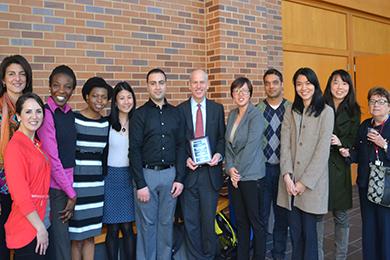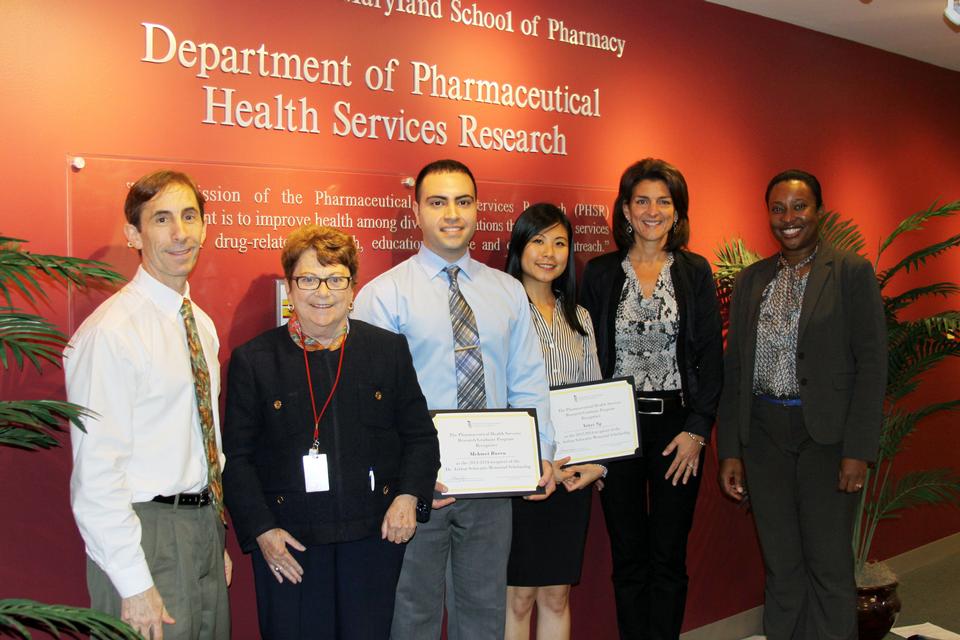PHSR Graduate Students Host First Campus-Wide Interdisciplinary Seminar
Dr. William Cooper delivers inaugural lecture spotlighting the field of pharmacoepidemiology.

By Malissa Carroll
May 2, 2014
More than 75 faculty, staff, and students from across the University of Maryland, Baltimore (UMB) attended the inaugural interdisciplinary seminar on pharmacoepidemiology hosted by members of the International Society for Pharmacoepidemiology (ISPE) student chapter at the University of Maryland School of Pharmacy on April 16. Titled “Not Quite What They Were Planning: Evaluating Unintended Consequences of Prescription Medications,” the seminar was presented by William Cooper, MD, MPH, the Cornelius Vanderbilt Professor of Pediatrics and Health Policy at Vanderbilt University in Nashville, Tenn.
“I am very proud of our ISPE student chapter for putting together such a worthwhile, timely, and quality interdisciplinary lecture,” said Julie Zito, BSPharm, PhD, professor in the Department of Pharmaceutical Health Services Research (PHSR), who delivered remarks on behalf of Natalie D. Eddington, PhD, FAAPS, FCP, dean and professor of the School. “The issue of unintended consequences of prescription medications is one that faculty, staff, and students at the School of Pharmacy confront daily. However, it is also a topic about which all of us as health care and human services professionals should be concerned. We all play an important role in ensuring that patients achieve optimal outcomes from the medications that they use.”
Pharmacoepidemiology looks at the use and effects of drugs in large populations. It is an interdisciplinary area of research, borrowing from both pharmacology and epidemiology. Cooper, whose current research focuses on the unexpected effects of medicine on children, adapted a popular storytelling method known as the “six-word memoir” to deliver his lecture.
“In recent years, UMB has become a champion for interdisciplinary collaboration,” said Mehmet Burcu, a graduate student in the PHSR PhD Program and member of the ISPE student chapter, who chaired the committee that organized the seminar. “We wanted to leverage this reputation to introduce ourselves and build connections across the University. Dr. Cooper was the perfect speaker to deliver our inaugural seminar. Not only is he internationally recognized, but much of his success comes from his work with an interdisciplinary team. He is an excellent practitioner and pharmacoepidemiologist who serves as a great example for us as aspiring health services researchers.”
“It is an honor to be part of this inaugural seminar,” said Cooper. “I have been truly impressed with the breadth and depth of knowledge among graduate students in the PHSR PhD Program at the School of Pharmacy. Their passion for informing policy is very exciting, and this event represents a unique opportunity for us as physicians, pharmacists, nurses, and human services professionals to bring our strengths together and make a difference in the lives of those we serve.”
Throughout the seminar, Cooper highlighted several case studies that led him and his team to refocus their research endeavors to better answer questions about the unintended consequences of medications on different patient populations. “These are such powerful stories. Each of you will have experiences similar to these that will inform your own career development,” he said.
One of the six-word memoirs Cooper presented read, “…we didn’t have any other choice.” It told the story of an eight-year-old boy who was prescribed an antipsychotic medication to treat the aggression that he was experiencing as a result of attention deficit hyperactivity disorder. Though it treated the aggression, the medication also caused the child to gain a significant amount of weight in a very short time, putting him at risk for developing a number of obesity-related illnesses, including diabetes.
“Medications are intended to help people, but they can sometimes have unanticipated consequences,” said Cooper. “As health care professionals, we have a responsibility to come to work each day and make a difference. We need to go beyond simply identifying the adverse effects associated with these medications and take the next step to determine how we can help our patients.”
In addition to Burcu, PHSR graduate students and ISPE student chapter members Patience Moyo and Xinyi Ng led the effort to plan, organize, and fundraise for the event. “We wanted to host an event that would not only benefit our organization, but the greater University community as well,” said Moyo.
Their goal was to raise awareness about pharmacoepidemiology and foster interdisciplinary learning and research across the University’s six professional schools and graduate school. “It felt great to celebrate our organization’s first campus-wide event with faculty, staff, and students from each school within UMB. We were very pleased to see how receptive our peers were to the interdisciplinary developments taking place across our campus,” said Ng.
“It was wonderful to see student empowerment meet the University’s collaborative research agenda,” said Zito, who also serves as a faculty advisor for the ISPE student chapter. “The experience of planning and executing this seminar will serve our students well in their future careers.”
Susan dosReis, BSPharm, PhD, associate professor in PHSR and co-advisor for the ISPE student chapter, added, “Our student members truly went above and beyond expectations to host a first-of-its-kind, campus-wide event to help spread the word about not only the chapter itself, but the importance of pharmacoepidemiology as a field of research.”



